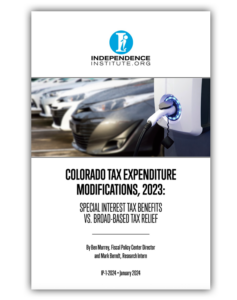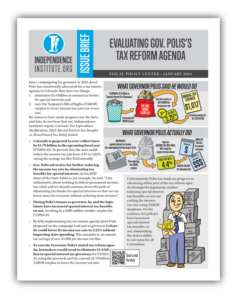Colorado’s governor, Jared Polis, champions increasing state revenue by eliminating provisions of the tax code that benefit special interests—what state budgeters call “tax expenditures.” Rather than use the new money to grow government or redistribute surplus revenue through tax handouts and Taxpayer’s Bill of Rights (TABOR) refunds, however, the governor argues the state should use the revenue to provide tax relief for all Colorado taxpayers through income tax rate reductions. As far back as 2018, Polis campaigned on this tax reform approach. This report evaluates Governor Polis’s progress in advancing these tax reform goals. By calculating the revenue impact of each tax expenditure modification, it determines whether legislation broadened the tax base by eliminating tax loopholes or narrowed the tax base by handing out more special interest tax benefits. Calculating the equivalent state income tax rate change using revenue from tax expenditure modifications displays whether Polis and the legislature’s tax expenditure policies increased or diminished the state’s ability to provide broad-based tax relief to all Colorado taxpayers.
The report found:
- By fully implementing the tax reform agenda Jared Polis proposed on the campaign trail and as governor, Colorado could lower its income tax rate to 3.25% without impacting state spending. This amounts to an annual tax savings of over $1,000 per income tax filer.
- To execute Governor Polis’s stated tax reform agenda, lawmakers would need to eliminate $1.8 billion in special interest tax giveaways for FY2024-25, using the proceeds and the current $1.79 billion TABOR surplus to lower the income tax rate.
- Unfortunately, Polis has made no progress in advancing either part of his tax reform agenda through the legislature, neither reducing special interest tax benefits nor cutting the income tax rate using TABOR surpluses. On the contrary, his policies have increased special interest tax benefits on net, diminishing the state’s ability to cut taxes for all.
-
In Taxpayer’s Bill of Rights (TABOR) surplus years, increases in tax benefits for special interests reduce the TABOR surplus by the same amount. This in turn reduces TABOR refunds and the state’s ability to reduce tax rates for all Coloradans without impacting spending on state programs.
- In 2023 alone, Polis and lawmakers increased special interest tax handouts by about 2.5 times more than they did in the previous four years combined.
- Legislation adopted in 2023 alone expanded special interest tax benefits on net by $1.64 billion over the next decade, reducing total TABOR refunds by an estimated $465.
- All legislation passed since Polis took office has expanded special interest tax benefits on net for the current fiscal year (FY2023-24) by an estimated $450 million, or $130 per income tax filer. Legislation adopted in 2023 alone expanded special interest tax benefits on net for FY2023-24 by about $320 million, or about $90 per income tax filer.
- Legislation adopted in 2023 expanded special interest tax benefits on net for FY2024-25 by about $200 million, or about $56 per income tax filer.
- Despite reductions in TABOR revenue from recent expansions in special interest tax benefits, the current projected FY2024-25 TABOR surplus could buy down the income tax rate from 4.40% to 3.82%—a tax savings of about $510 per filer— without impacting state spending.
- Had the legislature not modified any tax expenditures in 2023, the FY2024-25 TABOR surplus could buy down the state income tax rate by an additional 0.06% to 3.76% without impacting state spending—a tax savings of about $565 per filer
This report does not attempt to evaluate the merits of creating, expanding, reducing, or eliminating specific tax expenditures. It aims simply to identify and provide quantitative and qualitative analysis of tax expenditure modifications and explore how those changes impact TABOR revenues and the state’s ability to provide broad-based tax relief.










